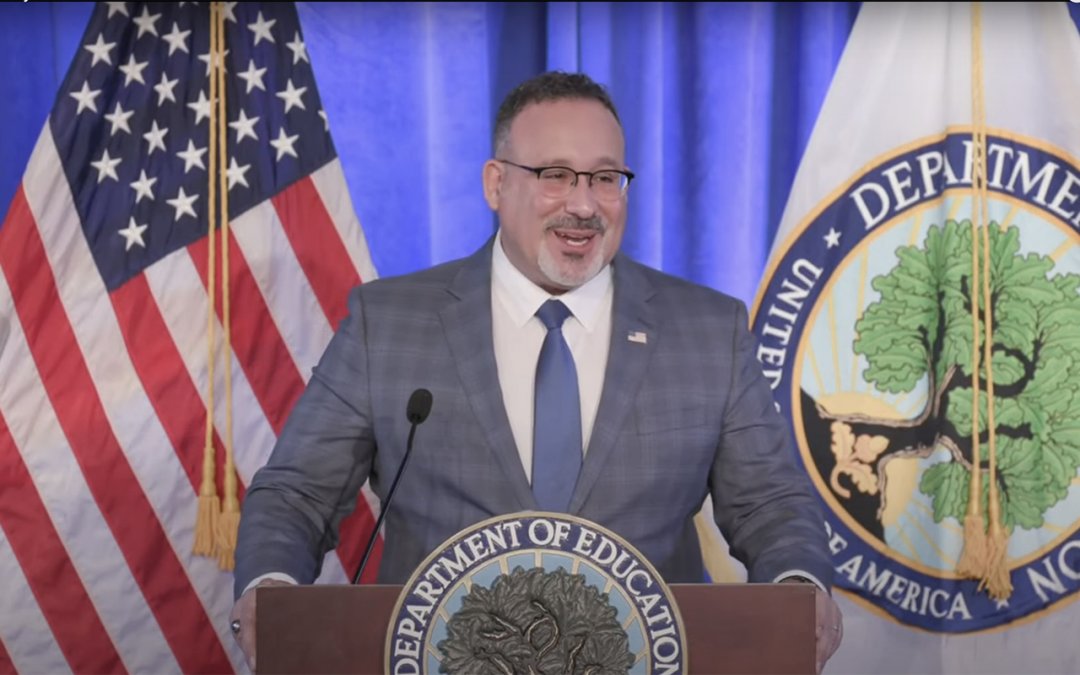WASHINGTON — Education Secretary Miguel Cardona on Thursday made the case for a “reset in education” strategies to address COVID-19-related stressors that have overwhelmed most students and teachers, but disproportionately impacted those already marginalized.
“To my colleagues in the field: I know you’re tired. I know you’re stretched. You probably feel how I felt when I was trying to reopen schools during the first part of the pandemic – truly felt impossible,” said the former teacher and principal in his speech from the Department of Education headquarters. “I see you and I understand what you’re going through. It will get better.”
Cardona has prioritized keeping schools in person amid case surges due to the Omicron variant. The secretary wrote in August that his agency would use “every tool in our toolbox to protect the health and safety of students and educators.” The Department of Education has opened civil rights probes into states that banned mask mandates in schools.
“Just over one year into President Biden’s term, we know what to do,” Cardona said. “But I recognize the daily challenges our students, our parents, and educators still face. We have better tools to keep schools safe and thriving amidst a pandemic.”
He also reaffirmed his support for raising teachers’ wages.
“Let’s not just talk about honoring educators, let’s make sure they are treated with the respect and the dignity they deserve,” Cardona said. “This means a livable wage, it means ongoing professional learning and development, supportive working conditions and a work environment where their voices are welcome as critical partners in our work to improve education.”
The secretary recommended using American Rescue Plan funds for mental health support and tutoring.
Suicidal behavior and mental health challenges have increased significantly among students during the pandemic, according to a report from the U.S. Surgeon General. A surge of new data shows students, particularly students of color, have lost months of learning due to the pandemic.
“Our schools must offer increased access to mental health support for students, wraparound programs meaningful and authentic, parent and family engagement and interventions for those students who felt the impact of the pandemic much more bluntly than others,” Cardona said.
The former assistant superintendent set goals for districts to meet, such as making sure students have access to at least one mental health professional, every high school has at least one career counselor and every high school student participates in at least extracurricular activity at their school.
“I’d like to challenge all of our district leaders to set a goal of giving every child that fell behind during the pandemic at least 30 minutes per day, three days a week, with a well-trained tutor who is providing that child with consistent, intensive support,” he said, adding: “Let’s work to meet the President’s goal of doubling the number of school counselors, social workers, and mental health professionals in our schools.”
Cardona also pushed for policy initiatives in line with President Biden’s promises on the campaign trail, such as free universal preschool, federal funding for what are called Title 1 schools where at least 40% of students are from low-income families, additional special education teachers and funding for schools under the Individuals with Disabilities Education Act, which governs disability-focused services.
He also touted the Biden administration’s cancellation of $15 billion in student loan debt through overhauls of current federal loan programs. Biden promised to erase $10,000 of student loans per person, but Congress dropped the student loan provision from Build Back Better, the president’s signature legislative policy measure.
“I’m really proud that as of last week our changes have made 70,000 doctors, nurses, veterans, service members, teachers, and others and public service fields eligible for $5 billion in loan relief,” Cardona said, referring to the department’s overhaul of a program focused on forgiveness for public servants.
According to data from the Federal Student Aid office, 43.4 million Americans hold $1.6 trillion of federal student loans. The Biden administration has extended the pause on student loan repayments until May 1.
“We’re committed to supporting every student loan borrower when they transition back into repayment,” Cardona said. “No one should be forced to make a payment they cannot afford.”



